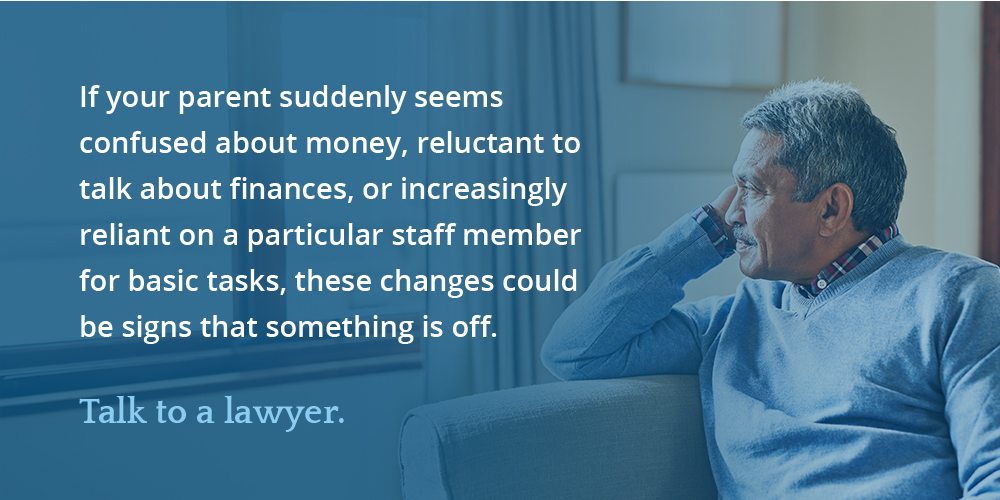
Placing your parent in a nursing home or arranging for in-home care is a decision rooted in trust. You have to be able to trust that their caretakers will meet their medical needs, treat them with dignity, and safeguard their well-being. But when financial exploitation enters the picture, that trust can dissolve into confusion, fear, and outrage.
At our office, we take this issue seriously. Our Peoria, IL nursing home abuse attorneys and firm are a small division of a larger law firm, which means every client receives focused, personalized attention without sacrificing the resources, strategy, or reach of a full-scale litigation team. We have the capacity to investigate complex fraud while keeping our clients’ families informed every step of the way. And we offer free consultations because time is critical in elder financial abuse cases.
Understanding Elder Financial Abuse in Illinois
In Illinois, stealing from an elderly person is more than unethical. It is a crime. The Illinois Criminal Code classifies this behavior under Section 720 ILCS 5/17-56, which defines financial exploitation of an elderly person or disabled adult. This type of abuse includes the unauthorized use of money, checks, credit cards, or property for the benefit of someone other than the elderly person. It may involve deceptive requests for money, misuse of legal authority like power of attorney, or even outright theft.
In nursing homes and care facilities, financial exploitation often comes from the very people charged with protecting the resident. Caregivers may help themselves to a resident’s cash, trick them into writing checks, take their credit cards to use for personal purchases, or convince them to make unnecessary financial gifts. Others might access digital accounts, manipulate mail, or pressure the person into changing their will.
What makes financial abuse particularly insidious is how easily it can be hidden and how rarely it is reported. Many victims do not realize it is happening. Some are embarrassed. Others are too afraid to speak out, especially if they depend on the abuser for meals, medication, or mobility.
How to Spot the Signs That Someone is Stealing Your Parent’s Money
If your parent suddenly seems confused about money, reluctant to talk about their finances, or increasingly reliant on a particular staff member for basic tasks, these changes could be signs that something is off. Keep an eye out for missing checkbooks, late bill notices, or unexplained bank withdrawals. A drastic change in spending habits — especially when your parent has cognitive decline — may also suggest interference.
Another red flag arises when a caregiver appears overly invested in your parent’s financial decisions. If a staff member or aide suddenly becomes the “go-to” person for your parent’s errands, payments, or mail, ask questions. You may notice they seem overprotective, resistant to your involvement, or dismissive when you raise concerns.
Loved ones often sense when something is not right, even if they cannot articulate it. If your gut tells you that your parent’s money is disappearing or being managed by someone who has no legal authority, do not wait for a dramatic incident. Small acts of theft often escalate.

What to Do if You Suspect a Parent’s Caretaker of Theft
If you are worried that someone is stealing your parent’s money, start with your parent. Ask open-ended, non-judgmental questions. Try to understand whether they have loaned money, changed financial habits, or given someone access to their accounts. Your parent may be embarrassed, unsure, or unwilling to talk. If so, shift your focus to gathering information.
Review their bank records. Look for repeated ATM withdrawals, new accounts, missing statements, or payments made to unfamiliar names. If their credit cards are being used in strange locations or for purchases they could not have made, document the transactions. Ask the nursing home for a ledger of any accounts they maintain internally, especially if your parent receives cash or allowance through the facility.
Once you have a baseline understanding, report your concern to the facility director or administrator. If the suspected theft involves an employee, the facility may be required to report the conduct to the Illinois Department of Public Health or Adult Protective Services.
Next, contact a lawyer. An experienced elder law attorney can help you preserve financial records, identify potential civil claims, and intervene to prevent further harm. They may also help you file a report with the Illinois Department of Financial and Professional Regulation if licensed caretakers are involved.
Legal Options to Recover Stolen Money in a Nursing Home
In Illinois, victims of elder financial abuse may have the right to file a civil lawsuit against the individual or facility responsible. If your parent’s assets were misused, stolen, or coerced from them, your attorney can initiate legal action to recover those funds and hold the wrongdoer accountable. Depending on the facts, your case might involve claims of conversion (civil theft), fraud, breach of fiduciary duty, or violations of the Illinois Nursing Home Care Act.
Sometimes, the person stealing is not a stranger, but someone with official control over your parent’s finances. When financial abuse is tied to misuse of a legal document, such as a power of attorney or guardianship, courts have the power to revoke that authority and appoint a neutral third party to oversee your parent’s finances. In severe cases, civil lawsuits can seek punitive damages.
Illinois law imposes strict fiduciary duties on anyone entrusted with another’s money. A person who has power of attorney must act solely in the principal’s best interest. They must avoid self-dealing, keep records, and never mix their funds with your parent’s. When these duties are violated, courts can void transactions and impose serious penalties.
Even if your parent voluntarily signed over control, they may not have understood the risks. In cases involving dementia, undue influence, or misrepresentation, a lawyer can help petition to void the document and recover what was lost. The earlier you act, the stronger your claim may be.
Take Action to Stop Financial Exploitation of Your Parent Before More Damage Is Done
The longer financial exploitation continues, the harder it is to repair the harm. Even if you are not sure how much has been stolen, or whether the behavior you suspect is even illegal, it is worth investigating. Trust your instincts. Many elder financial abuse cases start with nothing more than a concerned child asking, “Why does this not feel right?”
If your parent is in a facility, demand transparency. If you are reviewing their finances, document everything. If the caretakers refuse to answer your questions or treat you like an inconvenience, escalate. And if you find proof — or even a strong indication — that your parent’s money is being misused, do not wait to involve a lawyer.
Contact a Peoria, IL Elder Financial Abuse Lawyer
If you suspect that a caretaker, facility staff member, or financial agent is exploiting your loved one, you need answers and your parent deserves protection. At Nursing Home Injury Center, our Peoria County nursing home abuse attorneys help families confront elder financial abuse with clarity and strength. We know how to investigate subtle fraud, build strong cases, and recover what was taken. And because we are a small division of a large firm, you get the best of both worlds: individualized attention and the firepower to win.
Call us at 309-524-6900 today for a free consultation. The sooner you act, the more we can do to safeguard your parent’s rights, dignity, and future.



